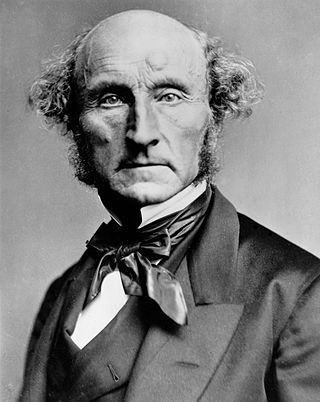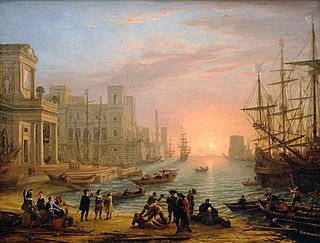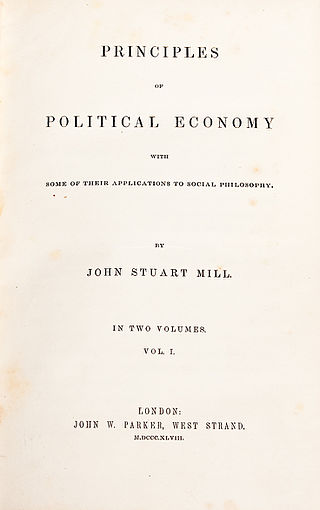Related Research Articles

David Ricardo was a British political economist. He was one of the most influential of the classical economists along with Thomas Malthus, Adam Smith and James Mill. Ricardo was also a politician, and a member of the Parliament of Great Britain and Ireland.

Economics is the social science that studies the production, distribution, and consumption of goods and services.

John Stuart Mill was an English philosopher, political economist, Member of Parliament (MP) and civil servant. One of the most influential thinkers in the history of classical liberalism, he contributed widely to social theory, political theory, and political economy. Dubbed "the most influential English-speaking philosopher of the nineteenth century", he conceived of liberty as justifying the freedom of the individual in opposition to unlimited state and social control.
The labor theory of value (LTV) is a theory of value that argues that the economic value of a good or service is determined by the total amount of "socially necessary labor" required to produce it.

Mercantilism is an economic policy that is designed to maximize the exports and minimize the imports for an economy. It promotes imperialism, colonialism, tariffs and subsidies on traded goods to achieve that goal. The policy aims to reduce a possible current account deficit or reach a current account surplus, and it includes measures aimed at accumulating monetary reserves by a positive balance of trade, especially of finished goods. Historically, such policies frequently led to war and motivated colonial expansion. Mercantilist theory varies in sophistication from one writer to another and has evolved over time.

Alfred Marshall was an English economist, and was one of the most influential economists of his time. His book Principles of Economics (1890) was the dominant economic textbook in England for many years. It brought the ideas of supply and demand, marginal utility, and costs of production into a coherent whole. He is known as one of the founders of neoclassical economics.
Classical economics, classical political economy, or Smithian economics is a school of thought in political economy that flourished, primarily in Britain, in the late 18th and early-to-mid 19th century. Its main thinkers are held to be Adam Smith, Jean-Baptiste Say, David Ricardo, Thomas Robert Malthus, and John Stuart Mill. These economists produced a theory of market economies as largely self-regulating systems, governed by natural laws of production and exchange.
The subjective theory of value is an economic theory which proposes the idea that the value of any good is not determined by the utility value of the object, nor by the cumulative value of components or labour needed to produce or manufacture it, but instead is determined by the individuals or entities who are buying or selling the object in question. This trend is often seen in collectable items such as cars, vinyl records, and comic books. The value of an object may have increased substantially since its creation or original purchase due to age, a personal affinity, or scarcity.
In classical economics, Say's law, or the law of markets, is the claim that the production of a product creates demand for another product by providing something of value which can be exchanged for that other product. So, production is the source of demand. In his principal work, A Treatise on Political Economy, Jean-Baptiste Say wrote: "A product is no sooner created, than it, from that instant, affords a market for other products to the full extent of its own value." And also, "As each of us can only purchase the productions of others with his own productions – as the value we can buy is equal to the value we can produce, the more men can produce, the more they will purchase."

On the Principles of Political Economy and Taxation is a book by David Ricardo on economics. The book concludes that land rent grows as population increases. It also presents the theory of comparative advantage, the theory that free trade between two or more countries can be mutually beneficial, even when one country has an absolute advantage over the other countries in all areas of production.

Surplus product is an economic concept explicitly theorised by Karl Marx in his critique of political economy. Roughly speaking, it is the extra goods produced above the amount needed for a community of workers to survive at its current standard of living. Marx first began to work out his idea of surplus product in his 1844 notes on James Mill's Elements of political economy.
The law of rent states that the rent of a land site is equal to the economic advantage obtained by using the site in its most productive use, relative to the advantage obtained by using marginal land for the same purpose, given the same inputs of labor and capital.
The history of economic thought is the study of the philosophies of the different thinkers and theories in the subjects that later became political economy and economics, from the ancient world to the present day in the 21st century. This field encompasses many disparate schools of economic thought. Ancient Greek writers such as the philosopher Aristotle examined ideas about the art of wealth acquisition, and questioned whether property is best left in private or public hands. In the Middle Ages, Thomas Aquinas argued that it was a moral obligation of businesses to sell goods at a just price.

Principles of Political Economy (1848) by John Stuart Mill was one of the most important economics or political economy textbooks of the mid-nineteenth century. It was revised until its seventh edition in 1871, shortly before Mill's death in 1873, and republished in numerous other editions. Beside discussing descriptive issues such as which nations tended to benefit more in a system of trade based on comparative advantage, the work also discussed normative issues such as ideal systems of political economy, critiquing proposed systems such as communism and socialism. Along with A System of Logic, Principles of Political Economy established Mill's reputation as a leading public intellectual. Mill's sympathetic attitude in this work and in other essays toward contemporary socialism, particularly Fourierism, earned him esteem from the working class as one of their intellectual champions.
Throughout modern history, a variety of perspectives on capitalism have evolved based on different schools of thought.
Exploitation of labour is a concept defined as, in its broadest sense, one agent taking unfair advantage of another agent. It denotes an unjust social relationship based on an asymmetry of power or unequal exchange of value between workers and their employers. When speaking about exploitation, there is a direct affiliation with consumption in social theory and traditionally this would label exploitation as unfairly taking advantage of another person because of their inferior position, giving the exploiter the power.
In Marxian economics, surplus value is the difference between the amount raised through a sale of a product and the amount it cost to the owner of that product to manufacture it: i.e. the amount raised through sale of the product minus the cost of the materials, plant and labour power. The concept originated in Ricardian socialism, with the term "surplus value" itself being coined by William Thompson in 1824; however, it was not consistently distinguished from the related concepts of surplus labor and surplus product. The concept was subsequently developed and popularized by Karl Marx. Marx's formulation is the standard sense and the primary basis for further developments, though how much of Marx's concept is original and distinct from the Ricardian concept is disputed. Marx's term is the German word "Mehrwert", which simply means value added, and is cognate to English "more worth".

Das Kapital, also known as Capital: A Critique of Political Economy or sometimes simply Capital, is a foundational theoretical text in materialist philosophy, critique of political economy and politics by Karl Marx. Marx aimed to reveal the economic patterns underpinning the capitalist mode of production in contrast to classical political economists such as Adam Smith, Jean-Baptiste Say, David Ricardo and John Stuart Mill. While Marx did not live to publish the planned second, third and fourth parts, the second and third volumes were completed from his notes and published after his death by his colleague Friedrich Engels; the fourth volume was completed and published after Engels's death by Marxist philosoper Karl Kautsky. Das Kapital is the most cited book published before 1950 in the social sciences.

Marxian economics, or the Marxian school of economics, is a heterodox school of political economic thought. Its foundations can be traced back to Karl Marx's critique of political economy. However, unlike critics of political economy, Marxian economists tend to accept the concept of the economy prima facie. Marxian economics comprises several different theories and includes multiple schools of thought, which are sometimes opposed to each other; in many cases Marxian analysis is used to complement, or to supplement, other economic approaches. Because one does not necessarily have to be politically Marxist to be economically Marxian, the two adjectives coexist in usage, rather than being synonymous: They share a semantic field, while also allowing both connotative and denotative differences.

Principles of Political Economy Considered with a View to their Applications, simply referred to as Principles of Political Economy, was written by the nineteenth-century British political economist Thomas Malthus in 1820. Malthus wrote Principles of Political Economy as a rebuttal to David Ricardo's On the Principles of Political Economy and Taxation. While the main focus of their work is to explain economic depressions in Europe and the reasons why they occur, Malthus uses his scholarship to explore price determination and the value of goods.